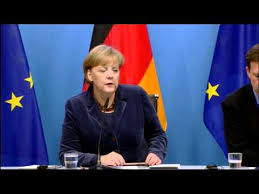By Rainer Buergin - Dec 31, 2012 3:00 AM GMT+0400
 Financial-market tensions have abated after the European Central Bank unveiled its Outright Monetary Transactions bond- buying plan on Sept. 6, pledging to spend as much money as needed to restore confidence in bond markets. The program provides support to debt-strapped nations as long as they sign up to economic reforms.
Financial-market tensions have abated after the European Central Bank unveiled its Outright Monetary Transactions bond- buying plan on Sept. 6, pledging to spend as much money as needed to restore confidence in bond markets. The program provides support to debt-strapped nations as long as they sign up to economic reforms.
German Chancellor Angela Merkel said the economic environment will be more difficult in 2013 than this year, and that Europe’s sovereign debt crisis is “far from over,” though progress has been made.
“The reforms that we’ve agreed on are starting to take effect,” Merkel, who faces federal elections in September, said in a New Year’s television speech to the nation, sent today in advance by e-mail. “Nevertheless, we still need a lot of patience. The crisis is far from over.”
The European Stability Mechanism, which is helping the Spanish government recapitalize the country’s banks, was established Sept. 27 after Germany ratified the agreement. About 200 of the 17-nation euro area’s biggest lenders will come under direct ECB oversight when the single supervisor becomes operational, targeted for March 2014.
In the meantime, the 500 billion-euro ($661 billion) ESM could aid banks directly using its own procedures and asking ECB supervisors to step in. The fund could act as a resolution mechanism as well as providing capital to ailing banks, as long as certain conditions are met, ECB Executive Board member Joerg Asmussen said Dec. 18 in Frankfurt.
Closer Coordination Needed
The euro region needs closer and more “binding” economic coordination, and Germany will make every effort in coming months to bring it about, Merkel’s deputy spokesman Georg Streiter said Dec. 28 at a regular government press conference in Berlin. Improved competitiveness is the key to lasting growth and job creation in the area, he said.
Merkel visited Athens for the first time in five years in October and said she wanted Greece to remain in the euro. A week later, she said Greece’s economic overhaul is taking hold and Germans should restrain finger-pointing at weak neighbors.
“For our prosperity and our cohesion, we need the right balance. We need the willingness to perform and social security for all,” Merkel said in her New Year’s speech. “The European sovereign debt crisis shows how important this balance is.”
With Greek Prime Minister Antonis Samaras delivering on austerity commitments and euro region leaders showing determination to keep the bloc intact, economists have scaled back their predictions of Greece’s euro exit.
Greece, Spain
Citigroup Inc. (C) has reduced the probability of Greece leaving the currency in the next 18 to 24 months to 60 percent. Economist Nouriel Roubini, who predicted the 2008 financial crisis, puts the risk at less than 50 percent.
The yield on Greek 10-year government bonds was little changed at 11.9 percent on Dec. 28 from a peak of more than 35 percent before the March debt restructuring.
Spanish Prime Minister Mariano Rajoy is emulating the policies Merkel’s predecessor Gerhard Schroeder carried out a decade ago, cutting government spending and labor costs. Spain’s trade deficit shrank 28 percent over the first 10 months of the year.
The country’s 10-year bond yield is 5.26 percent, a premium of almost 400 basis points above 10-year German bunds. While that still exceeds last year’s average of 280, it’s down from a euro-era high of 650 on July 25.
Merkel’s comments echo those of Bundesbank President Jens Weidmann. “The crisis seems to have calmed down at the moment,” Weidmann told Frankfurter Allgemeine Sonntagszeitungin an interview published yesterday. “There is progress in reforms. Far from all the causes have been eliminated,” he said, urging governments not to rely on the ECB for help.
Support for Merkel’s Christian Democratic Union and its Christian Social Union Bavarian sister party rose to 41 percent in a Forsa poll published Dec. 27 from 38 percent a week earlier. Backing for Merkel’s Free Democratic Party coalition ally slipped to 4 percent from 5 percent while the opposition Social Democrats held at 27 percent support and the Green Party fell to 13 percent from 14 percent. The anti-capitalist Left Party held at 8 percent support.
To contact the reporter on this story: Rainer Buergin in Berlin at rbuergin1@bloomberg.net
To contact the editor responsible for this story: James Hertling at jhertling@bloomberg.net